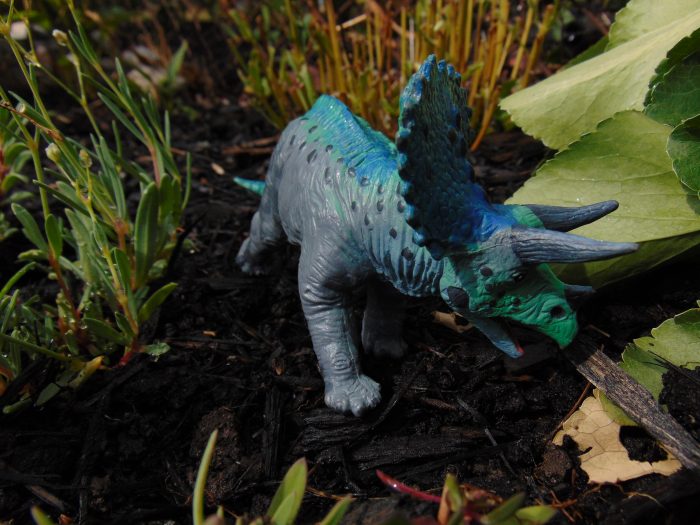
When it comes to iconic dinosaurs, even after the rise of Velociraptor and Spinosaurus from Jurassic Park fame, Triceratops is placed towards the top of the list along with Tyrannosaurus Rex and Stegosaurus. In fact, if I did a Greek Pantheon of Dinosaurs and replaced the top twelve Greek gods with Dinosaurs , Triceratops would get a top spot. The question would be who’s place would it take? Obviously in Zeus place would be T-Rex. Some might think that due to its three horns its equivalent would be Poseidon due to his trident, but I think not. I would replace Hera with Triceratops. First, Triceratops was a grazer and one of Hera’s symbols was a cow, I think that’s close enough too be match. Also, since T-Rex and Triceratops lived along side each other, they were married (Zeus and Hera were married) in the never ending dance between life and death, so I think the Triceratops is a good fit.
Of course your not here to read my nonsensical meanderings about Triceratops popularity, or its place in the cosmos, but to know a little bit more on the 1996 original Wild Safari Triceratops toy. This toy was made during the early days of the Wild Safari line which was meant as a cheaper alternative to the Carnegie line and more kid friendly. They had bright colors with soft, yet fun expressions.
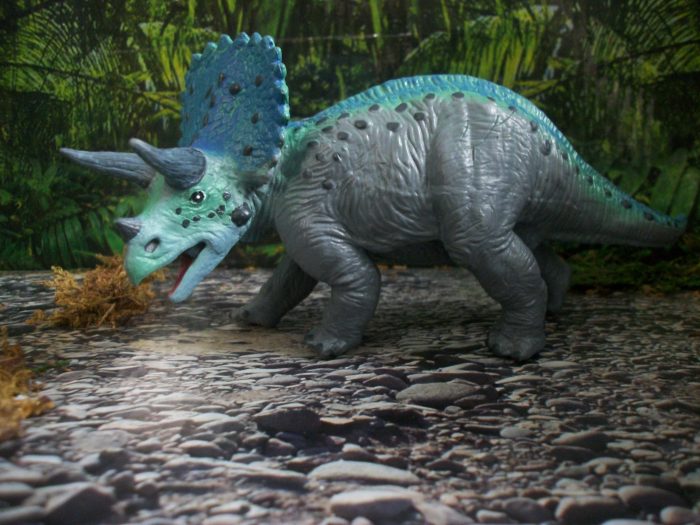
About the Toy: Its length is six and one eight inches (15.56 cm) from the tip of the horn to the tip of the tail. It is two and seven eight inches (7.3 cm) high at the frill. Adorning its head are the features that you would expect. Two brow horns and a nose horn and short frill. Even with a short frill, the skull and ornamentation of Triceratops was among the largest in land animals, making up approx one-third of the entire length of the dinosaur’s body. On this toy, the frill looks less rounded than it should and not quite as broad. The horns are wide at the base and are medium in length. It can be considered an acceptable length though I would favor longer brow horns.
Back when it roamed the world, its beak-like mouth was best suited for grasping and plucking rather than biting shrubs and vegetation. Unfortunately, the beak on this model is very small, it should have been bigger. Inside the mouth the tongue is absent. The cheeks are missing as well.
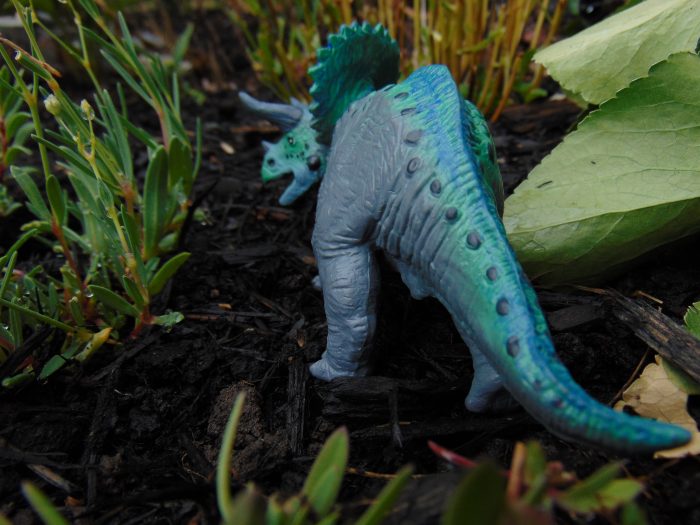
Triceratops had strong limbs to move and support its massive body. The forelimbs, which were shorter than the rear ones, supported the body weight on three fingers; the rear limbs carried its bulk on four fingers. On this toy there are five toes on front and four on the back. The front legs are supporting the weight directly underneath the body and the front feet on this model have the feet facing forward. Many scientific theories explain that ceratopsians carried their front feet with their palms facing each other, while the legs and elbow joints were only slightly sprawled.
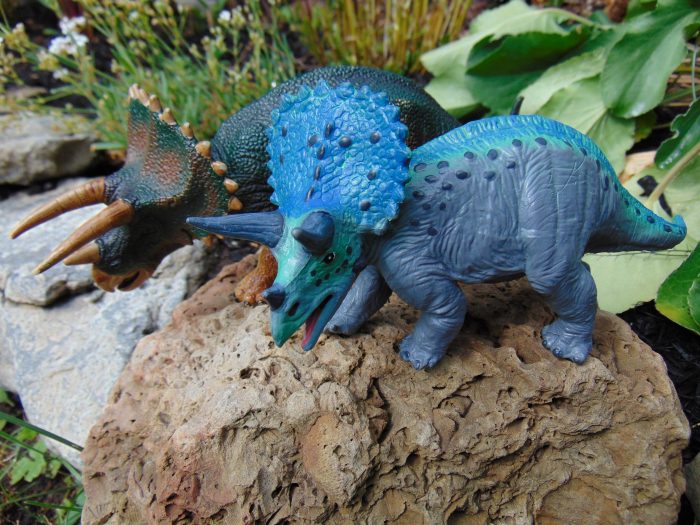
The pose is active. Its head is up and looking to its left while the right legs are spread. With its front right foot reaching forward and the back right foot almost into the air. It looks to be making a turn, maybe circling a rival, courting a mate, or about to face off against a threat. The mouth is open and the tail is bent slightly to its right. The detail on this toy is not as good as version 1 or 2 of the Carnegie’s, and falls well short of its Wild Safari replacement. The model does have sufficient bulk along with loose skin and slight muscle bulges. The texture of the body is basically loose rippled skin with some circular bumps. The head has some scales on the frill and along the entire spine are some small vertical lines.
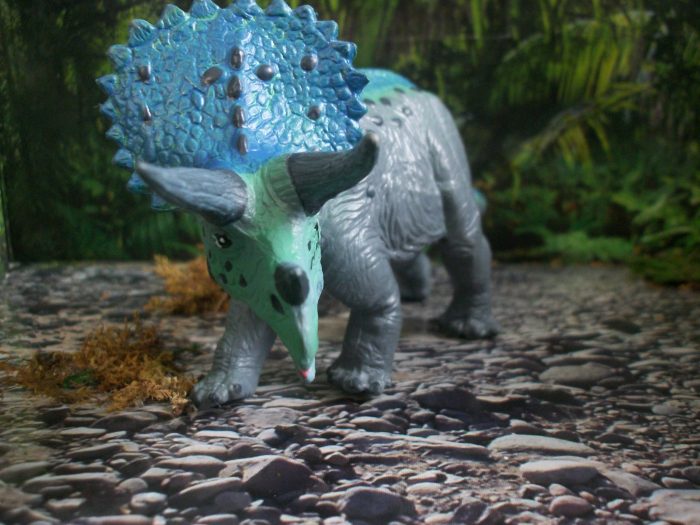
The color on this toy is bright and colorful. The base color is grey which covers the flanks, legs, and belly of the animal. The horns are a grey and charcoal mix. Inside the mouth is pink. The eyes are expressive, colored black with a white outline. Along the spine is a blue and light green mix. The rest of the frill is mostly blue with some light green and the head is mostly light green with some grey. The round bumps on its frill are charcoal and down the middle they form a christian cross pattern with three additional bumps on its left and two on the right. The rounded bumps are charcoal along the flanks all the way to the tail. The toes are painted in charcoal as well.
Safari also made a baby Triceratops that has the same blue, green, and grey color combo as the adult. There is also a brown version of this toy and its baby that in my opinion doesn’t look as good as the blue version.
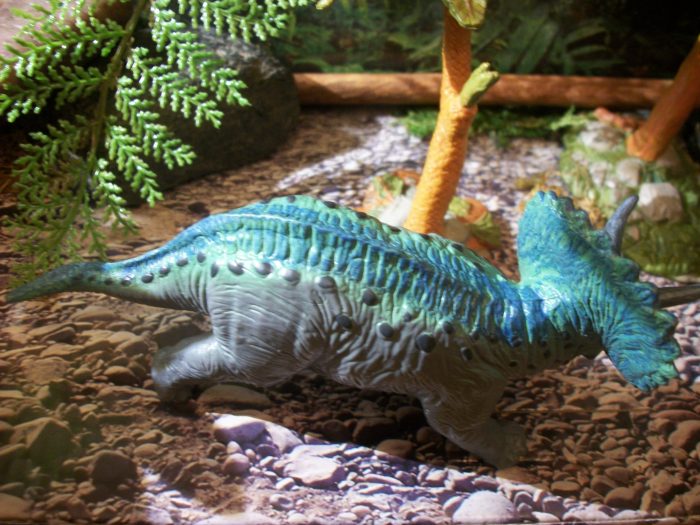
Play ability: Younger kids find it an enjoyable toy to play with. The colors are bright enough to get attention and with the head up, it looks ready to do battle or munch on plants. The tail, horns, and jaws are bendy enough to move with your fingers but retain their shape. Even though the horns are a little sharp, due to it being bendy, there is no danger. It is easy to use, and its tough enough to handle rough play. Safe for the sandbox and the living room floor.
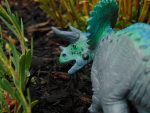
Overall: All in all, this figure is outdated, but cute. It doesn’t stack up to the newer Triceratops toys in details or accuracy. Of course it was designed to be a cheaper toy for kids, and it that capacity it does quite well. It also has a very cute and expressive eyes which gives it some personality, and personality goes along way. This model has been retired for a long time but it is easy to find if you want one. It is a flawed, colorful, and cute toy, that is good for kids. As for collectors, it depends on your cup of tea if you like a little cuteness or not.
Disclaimer: links to Ebay and Amazon on the DinoToyBlog are affiliate links, so we make a small commission if you use them. Thanks for supporting us!




Wild Safari certainly has come a long way, hope it continues to get better.
I have a completely brown version of this model and I’ve always hated it, I keep it in a box of unwanted dinosaurs up in my attic. I will admit that this color scheme is a lot more appealing, but not enough to change my mind about it. Great review all the same!
Thank you. This figure has grown on me over the years, but the brown version, yuch, it looks so bad in that color.